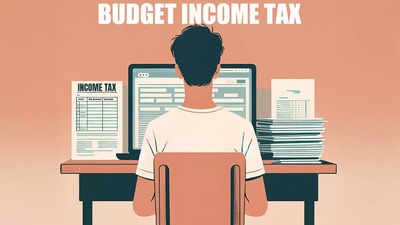- News
- Business News
- India Business News
- Budget 2025 income tax: Hike basic exemption limit to Rs 5 lakh and reduce tax rates, says EY
Trending
Budget 2025 income tax: Hike basic exemption limit to Rs 5 lakh and reduce tax rates, says EY
Budget 2025 income tax expectations: Finance Minister Nirmala Sitharaman is urged by EY to raise the basic income tax exemption limit from Rs 3 lakh to Rs 5 lakh and lower tax rates in the upcoming Budget 2025.
Budget 2025 income tax expectations: Finance Minister Nirmala Sitharaman should consider raising the basic exemption limit from Rs 3 lakh to Rs 5 lakh under the new tax regime, says EY in its pre-Budget 2025 recommendations.
EY, a leading consultancy firm among the big four, has also recommended that the government reduce income tax rates particularly for lower-bracket taxpayers, and continue TDS rationalisation in the Union Budget 2025.
EY has said, "The upcoming budget should focus on personal tax relief by raising the basic exemption limit in the new tax regime from Rs 3 lakhs to Rs 5 lakhs and reducing tax rates. Clarifications on the perquisite valuation for EVs and clear guidelines for the taxation of cryptocurrency and non-fungible tokens (NFT), including the treatment of virtual digital asset (VDA) losses, are needed.”
- EY also said that the cap on the set-off of house property losses against other heads should be removed.
- Including tier-2 cities like Hyderabad, Pune, Bengaluru, and Ahmedabad in the HRA exemption at 50% will provide tax parity.
- Further simplification is needed for employer contributions exceeding Rs 7.5 lakhs to specified funds. Deferring TDS on PF interest (above Rs 2.5 lakhs) until the withdrawal stage will reduce compliance burdens.
- The ESOP tax deferment benefit should be extended to all employers, allowing tax payment at the sale stage."
Also Read | Budget 2025: Modi government to simplify income tax filing rules, says report
The Modi government has initiated efforts to streamline Income Tax Laws. In the Budget 2024, presented in July 2024, Finance Minister Nirmala Sitharaman announced a review of the Income Tax Act, 1961. EY says, "It should follow a consultative approach and invite public comments on the draft proposals."
Income Tax litigation has immobilised over Rs 31 trillion in FY2023-24, representing 9.6% of India's GDP. EY's press release emphasises the urgent need to address and reduce pending disputes whilst preventing new ones.
Stay informed with the latest Business News on Times of India. Explore updates on International Business, gain insights with Financial Literacy tips, and make use of Financial Calculators. Don’t forget to check the list of Bank Holidays in 2025, including Bank Holidays in January.
Ready to Master Stock Valuation? ET’s Workshop is just around the corner!
End of Article
FOLLOW US ON SOCIAL MEDIA
Visual Stories
Hot Picks
TOP TRENDING
Explore Every Corner
Across The Globe

















